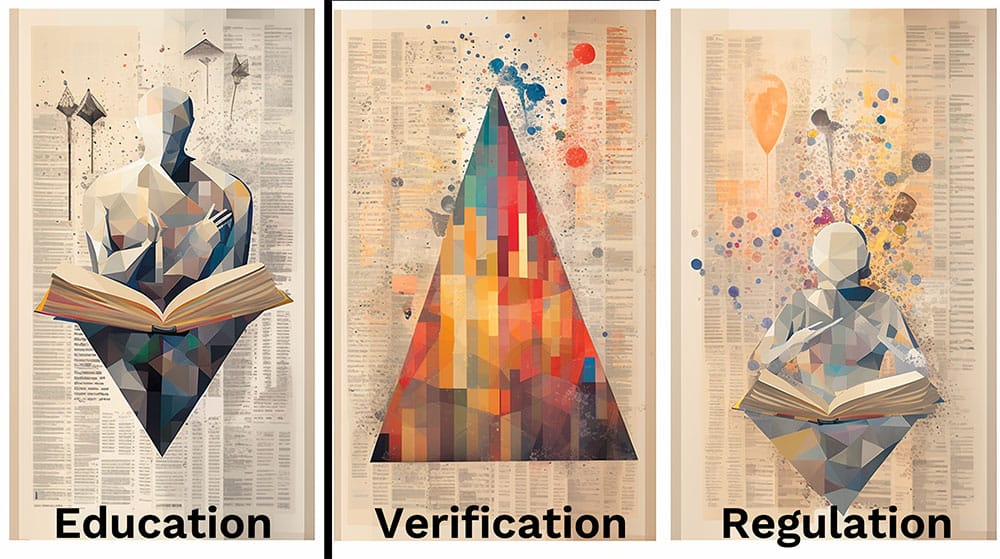Facing a New Reality: AI, The Good, The Bad and The Ugly

In my role as a strategic futurist and innovation keynote speaker, it is exciting to see the rapid advancement of generative AI and its potential to shape our society. Artificial intelligence and automation are catalysing a massive shift in business and society. Earlier today, I delivered a keynote at The Digital Banking Annual Meeting 2024 in Seoul, South Korea, with the objective of challenging the audience to think differently in the age of AI.
During my talk, I discussed that every financial institution must view itself as a data organisation operating within an interconnected data network. In this data-fuelled world, information is the most valuable resource for innovation and a competitive edge. Although it is a cliché, data really is the new oil – the most important resource of the 21st century.
In this modern era, AI doesn't merely dwell in abstract realms but interacts with the physical world through robotics, the information world through machine learning, and the human world through cognitive systems like ChatGPT. An automated cargo mover, for instance, symbolises how robotics seamlessly integrate with AI to transcend traditional boundaries, offering a glimpse into a future where machines and humans coexist and collaborate.
The AI world now beckons a seamless integration of the human, information, and physical domains. This integration is not merely a technical convergence but a philosophical one, redefining the scales of intelligent minds from a mouse to beyond the conceivable.
Generative AI and Financial Institutions

To capitalise on AI, financial companies need the proper data infrastructure in place. As I highlighted, even top financial institutions like JP Morgan have moved into the LLM space. JPMorgan recently launched a new language model called DocLLM, specifically designed for working with documents that have complex layouts. In addition, Bloomberg developed an AI assistant called BloombergGPT to synthesise massive amounts of financial data into easily accessible and actionable insights.
Institutions that don't have their data properly managed will struggle to implement AI. Proper data governance, consolidation in the cloud, cleaning, labelling and model training are crucial first steps.
Beyond data readiness, financial organisations must develop strategic foresight to understand how emerging technologies will disrupt operations, business models and work itself. AI and automation will affect jobs at all levels, not just routine blue-collar roles. Adaptability, therefore, becomes critical. Employees need continuous reskilling as occupations evolve alongside technology. Core human skills like emotional intelligence, creativity and ethics remain vital.
In this data-driven world, every organisation is essentially a data organisation and every industry is a data network. AI agents will soon interact autonomously on our behalf. Data has become the most valuable resource, the "new oil" that drives innovation. To innovate, organisations and individuals must embrace data and embed "smartness" into everything.
AI is a revolutionary technology that can make autonomous decisions, completely changing society. To prepare, we must stay knowledgeable about these changes and get our data in order. We need to become "fluent" in the language of data to navigate the future.
What is Generative AI?

Generative AI is a subset of AI that is capable of creating new and unique content, from text to images and video, to music and entire virtual worlds. This is done by training the AI model on a large dataset, allowing it to learn patterns and create new content based on those patterns. Generative AI has the potential to disrupt the way we create and experience reality by providing the ability to generate new and dynamic digital environments, characters, and interactions, in real-time.
During my talk, I warned that society has "sleepwalked" into the digital age without fully comprehending the implications of AI. Technologies like synthetic media raise concerns of misinformation and eroding truth. Deepfakes are already being used for financial fraud through manipulated video calls. More regulation, verification mechanisms and digital literacy education are urgently needed to build trust.
AI and Large Language Models For Finance

For the finance industry specifically, AI and large language models (LLMs) open possibilities to enhance efficiency, insight and value. As outlined in my presentation, LLMs can help automate the analysis of massive amounts of unstructured data from audit reports, financial statements and legal documents. This allows professionals to quickly identify discrepancies or compliance issues.
LLMs also facilitate detailed reporting and recommendations, improving transparency. Their analytical capabilities support data-driven decision-making regarding funds and sustainable development.
However, to realise these benefits, financial institutions need the right strategy and execution. Key steps highlighted include:
- Hiring data governance experts to oversee integration initiatives
- Consolidating data onto secure cloud platforms
- Cleaning and labelling data to train AI models
- Running pilots to test AI applications that automate monotonous tasks
- Using LLMs to generate insights from audit findings
- Producing automated reports tailored to stakeholder needs
- Monitoring regulations and standards to ensure compliance
- Identifying inefficiencies and cost-savings opportunities
Rather than fearing AI, finance professionals should see it as an opportunity to add more value. Technologies can handle routine tests and analysis, freeing up human experts to focus on high-level judgement, risk assessment, and advising clients. AI augments and elevates uniquely human skills like emotional intelligence, creativity, strategic thinking, and ethical reasoning.
How to Ensure a Thriving Digital Future

In the next decade, there will likely be a significant increase in the use of generative AI, completely changing our society. To achieve this vision, we must become digitally aware. We must wake up from doom-scrolling TikTok videos, and we must read the instruction manuals, if they existed, of these very powerful tools, especially when it involves children.
Yes, we are all busy leading our lives, but this is something so fundamental that we have to look up, we have to become aware of what’s happening and where we are going, because if we are not looking up, if we are ignoring the signals that our society is on a path of destruction, how will we be able to protect the future generation? We have to become digitally aware.
We can become digitally aware by focusing on three key areas: education, verification, and regulation.
Firstly, concerning education, the emphasis must be on globally disseminating knowledge about the technologies shaping our daily experiences. It's insufficient to merely incorporate AI into educational frameworks, as ethically sound as that might be; the real issue extends to elevating global digital literacy.
Secondly, let's address the issue of verification. With the increasing ubiquity and influence of AI in diverse aspects of life, the urgency to develop reliable methods for verifying the operations, intentions, and outputs of these systems cannot be overstated. This demands the creation of intricate systems and tools capable of effectively distinguishing AI-generated content and ascertaining the genuineness of digital identities in an ever-changing online ecosystem.
Lastly, let's focus on the matter of regulation. Despite noteworthy advancements in regulatory frameworks emerging from regions like the European Union, China, and the United States, the speed of bureaucratic processes leaves much to be desired. By the time regulations catch up, considerable harm can already be inflicted. Therefore, I believe we must take a different approach.
Final Thoughts

AI is a powerful but neutral tool. The ethical application of these technologies will shape the future we create as a society. Through smart adoption that balances benefits and risks, AI can help the finance industry worldwide enable accountable, transparent and responsible management of funds and investments. But the window of opportunity is short.
To prosper amidst exponential change, Van Rijmenam advises developing adaptability, strategic foresight, digital literacy and ethics. The jobs students train for now may not exist upon graduation. Technologies created today will impact society for decades, so we must think long-term.
Those financial institutions that act swiftly to get their data in order and pilot AI applications will gain a distinct competitive advantage. They will be best positioned to leverage AI in building stakeholder trust and upholding the public interest. The big shift towards an AI-integrated world is already underway.
Finance must adapt quickly or risk being disrupted. As van Rijmenam concluded, by proactively embracing education, verification and regulation around these exponential technologies, we can build a more innovative and sustainable digital future.





